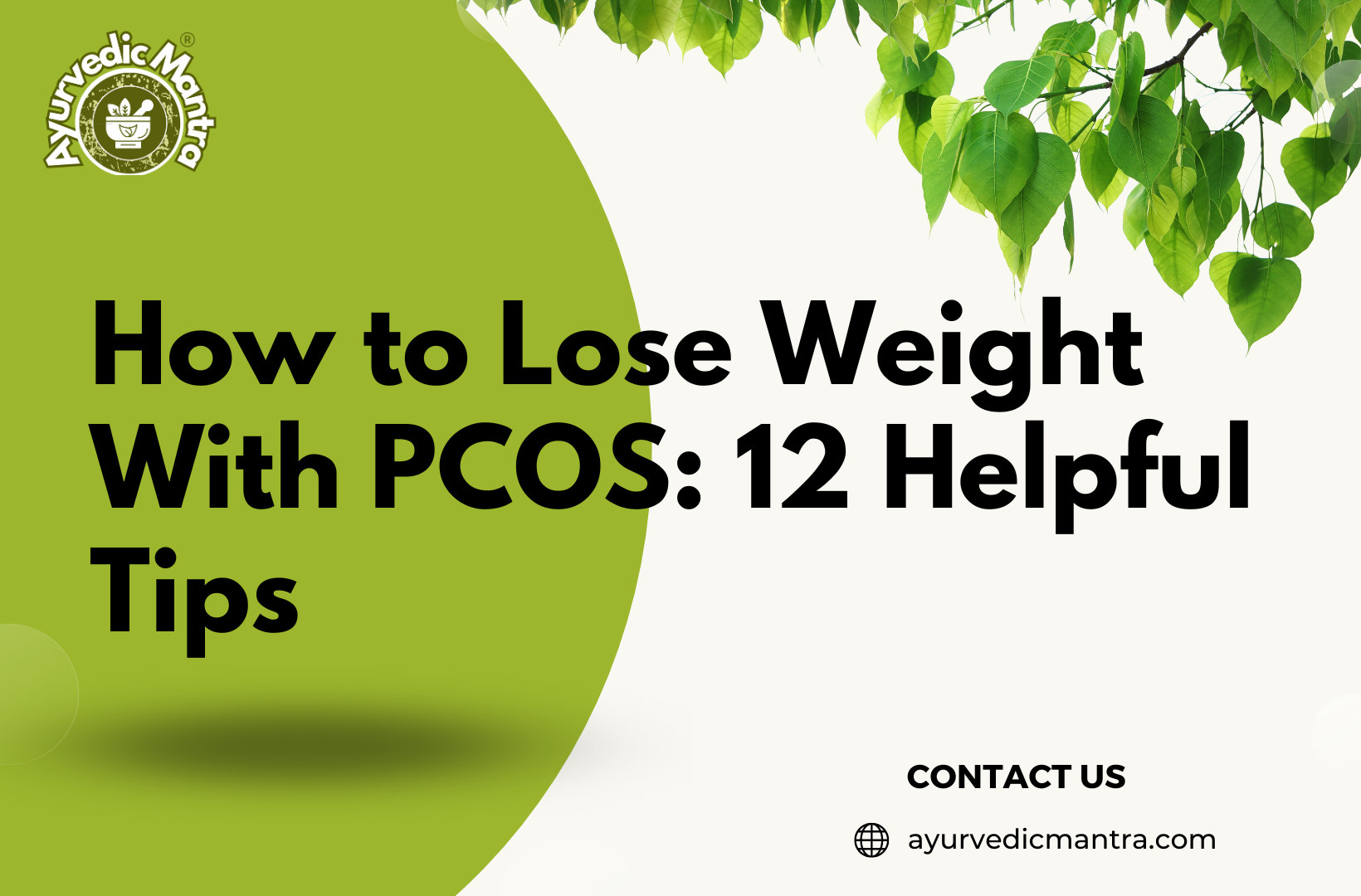
PCOD/PCOS: Ayurvedic Treatment is Best
Introduction Polycystic Ovary Disorder (PCOD) or Polycystic Ovary Syndrome (PCOS) is a common endocrine disorder affecting millions of women worldwide. It leads to hormonal imbalances,


Losing weight can be a challenging journey for anyone, but it can be an even more intricate process for those with Polycystic Ovary Syndrome (PCOS). PCOS is a hormonal disorder that affects many aspects of a woman’s health, including metabolism and weight management. However, with the right approach, achieving weight loss and improving overall well-being is possible. In this article, we’ll explore 12 helpful tips to guide you on your weight loss journey with PCOS.
Every individual’s body is different, especially for those with PCOS. Working with a healthcare professional to understand your body’s unique needs and challenges is crucial. A personalized approach to nutrition and exercise can make a significant difference in your weight loss efforts.
A balanced diet is key to managing weight with PCOS. Incorporate whole foods such as lean proteins, high-fiber grains, fruits, and vegetables. Avoid processed foods, sugary snacks, and excessive caffeine, as they can disrupt hormone balance.
Practice mindful eating by listening to your body’s hunger and fullness cues. Slow down during meals, savor each bite, and stop eating when you feel comfortably full. This approach can prevent overeating and promote better digestion.
Drinking plenty of water is essential for overall health and can support weight loss. Water helps control appetite, improves metabolism, and aids in digestion. Aim for at least eight glasses of water daily.
Engage in regular physical activity to boost your metabolism and aid in weight loss. Activities like brisk walking, swimming, or yoga can be beneficial. Find exercises you enjoy to make fitness a sustainable part of your routine.
Incorporate strength training exercises into your fitness plan. Building muscle mass can increase your resting metabolic rate, helping you burn more calories even at rest. Aim for two to three strength sessions per week.
Adequate sleep is crucial for hormonal balance and weight management. Strive for 7-9 hours of quality sleep each night. Create a calming bedtime routine and ensure your sleep environment is conducive to rest.
Chronic stress can exacerbate PCOS symptoms and hinder weight loss—practice stress-reduction techniques such as deep breathing, meditation, or spending time in nature. Find healthy outlets to manage stress effectively.
Be mindful of portion sizes to prevent overeating. Use smaller plates and bowls, and pay attention to recommended serving sizes. This practice can help control calorie intake and contribute to weight loss.
Work closely with your healthcare provider to manage your hormone levels. Medications or hormonal therapy may be recommended to regulate your menstrual cycle and improve your weight loss potential.
Consistency is key to successful weight loss. Set realistic goals and stay committed to your nutrition and fitness plan. Remember that progress may be gradual, but each step forward is closer to your goals.
Weight isn’t the only measure of success. Celebrate non-scale victories such as increased energy, improved mood, and self-confidence. These achievements can be powerful motivators on your journey.
In conclusion, losing weight with PCOS requires a holistic approach encompassing nutrition, exercise, sleep, and stress management. By understanding your body’s unique needs and making sustainable lifestyle changes, you can achieve your weight loss goals and improve your overall quality of life. Remember, you’re not alone on this journey, and with determination and the right strategies, success is well within reach.
Polycystic Ovary Syndrome (PCOS) is a hormonal disorder that can impact a woman’s reproductive health, metabolism, and weight management. Women with PCOS often experience insulin resistance, leading to weight gain and difficulty losing weight.
Yes, shedding excess weight can help improve many PCOS symptoms. Weight loss may lead to more regular menstrual cycles, reduced insulin resistance, and decreased androgen levels, which can contribute to better overall health.
Insulin resistance, common in PCOS, causes the body to produce more insulin to regulate blood sugar. Elevated insulin levels can increase fat storage and hinder weight loss efforts. Managing insulin through diet, exercise, and medication can aid weight management.
No one-size-fits-all diet for PCOS-related weight loss is recommended, but a balanced approach is recommended. Focus on whole foods, complex carbohydrates, lean proteins, and healthy fats. Some women with PCOS succeed with low-carb or Mediterranean-style diets, but consulting a healthcare provider or nutritionist is crucial for personalized guidance.
Chronic stress can worsen PCOS symptoms and hinder weight loss. Stress triggers the release of cortisol, which can disrupt hormonal balance and lead to weight gain, particularly around the abdominal area. Managing stress through relaxation techniques, exercise, and self-care is important for weight loss.
Certain supplements, such as inositol, berberine, and omega-3 fatty acids, have shown potential in aiding weight loss and improving PCOS symptoms. However, supplements should be taken under the guidance of a healthcare professional, and they should complement a healthy lifestyle, including proper nutrition and exercise.
Results vary among individuals, but it’s important to approach PCOS-related weight loss as a long-term journey. Sustainable changes take time to yield noticeable effects. With consistent adherence to a healthy lifestyle, including nutrition and exercise, you may see positive changes within a few months.
Certain birth control methods can regulate menstrual cycles and reduce androgen levels in women with PCOS, which may indirectly support weight management. However, the impact on weight varies, and discussing potential benefits and risks with a healthcare provider before making a decision is essential.
Adequate sleep is crucial for hormonal balance and weight management. Poor sleep quality and insufficient sleep can disrupt hormones that control appetite and metabolism, leading to weight gain and difficulty losing weight. Prioritizing sleep hygiene and getting 7-9 hours of quality sleep each night is beneficial.
Yes, seeking professional support is highly recommended for PCOS-related weight loss. Healthcare providers, registered dietitians, and fitness experts can offer personalized guidance, monitor progress, and adjust strategies as needed to ensure safe and effective weight loss while managing PCOS symptoms.

Introduction Polycystic Ovary Disorder (PCOD) or Polycystic Ovary Syndrome (PCOS) is a common endocrine disorder affecting millions of women worldwide. It leads to hormonal imbalances,

Introduction Losing weight is a journey that requires dedication, consistency, and self-care. While there are numerous weight loss techniques out there, not all of them

Polycystic Ovary Syndrome (PCOS) is a hormonal disorder that affects millions of women worldwide. It can lead to various health complications, such as irregular periods,

In recent years, Ayurveda, an ancient system of natural healing originating from India, has gained significant popularity as an alternative approach to treating various health

आजकल वजन बढ़ने और चर्बी की वृद्धि होने की समस्या एक आम समस्या बन गई है। बढ़ते वजन और अतिरिक्त चर्बी के कारण न केवल

प्रस्तावना: आजकल वजन बढ़ने और ओबेसिटी की समस्या एक आम समस्या बन गई है। बढ़ते वजन के कारण न केवल शारीरिक समस्याएं होती हैं, बल्कि
